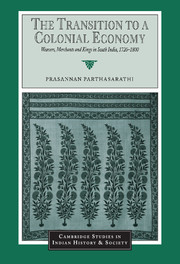Book contents
- Frontmatter
- Contents
- List of tables
- Acknowledgments
- Note on Indian words and place names
- Note on money
- List of abbreviations
- Introduction
- 1 Weavers and merchants 1720–1760
- 2 Agriculture and cotton textiles
- 3 Weaver distress 1765–1800
- 4 Weaver protest
- 5 Laborers, kings and colonialism
- Glossary
- Bibliography
- Index
- Titles in the series
Introduction
Published online by Cambridge University Press: 05 July 2009
- Frontmatter
- Contents
- List of tables
- Acknowledgments
- Note on Indian words and place names
- Note on money
- List of abbreviations
- Introduction
- 1 Weavers and merchants 1720–1760
- 2 Agriculture and cotton textiles
- 3 Weaver distress 1765–1800
- 4 Weaver protest
- 5 Laborers, kings and colonialism
- Glossary
- Bibliography
- Index
- Titles in the series
Summary
Low wages and a degraded status for laborers are undeniable features of contemporary South Asia. In the case of India, substantial numbers of workers are subject to endemic hunger and chronic insecurity as they receive incomes which are both uncertain and insufficient to meet their minimum needs for food, clothing and shelter. The position of laborers, be they industrial or agricultural, urban or rural, men or women, is further weakened by the fact that some 40 percent of the population live below the poverty line and supply for employers a vast “reserve army of unemployed.” The situation in Pakistan and Bangladesh is largely similar.
In the opinion of many historians, these conditions are not novel, but have characterized the subcontinent for several centuries. Support for this view may be found in the accounts of European visitors, who since the fifteenth century have described the working people of India as scantily clad, undernourished, poorly paid and subject to the capricious abuses of their political and economic superiors. Historians have often too easily accepted the accounts of these visitors. W. H. Moreland, drawing upon these sources, concluded that in the sixteenth century “the masses lived on the same economic plane” as in the early twentieth century. The opinions of European travelers inform Irfan Habib's magisterial account of the decline of the Mughal Empire, which he traced to peasant revolts in protest against endemic state oppression and consequent poverty.
- Type
- Chapter
- Information
- The Transition to a Colonial EconomyWeavers, Merchants and Kings in South India, 1720–1800, pp. 1 - 8Publisher: Cambridge University PressPrint publication year: 2001

